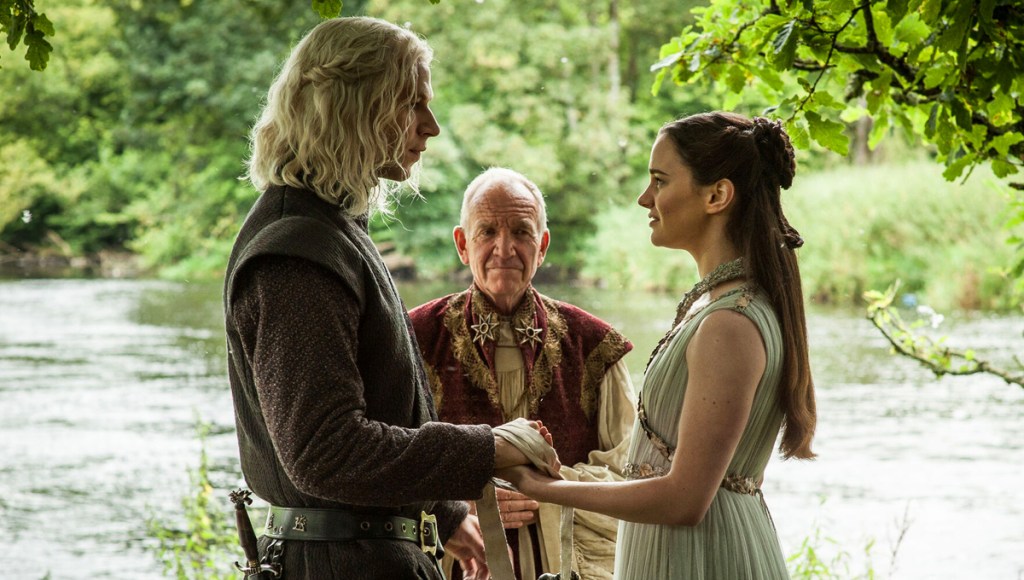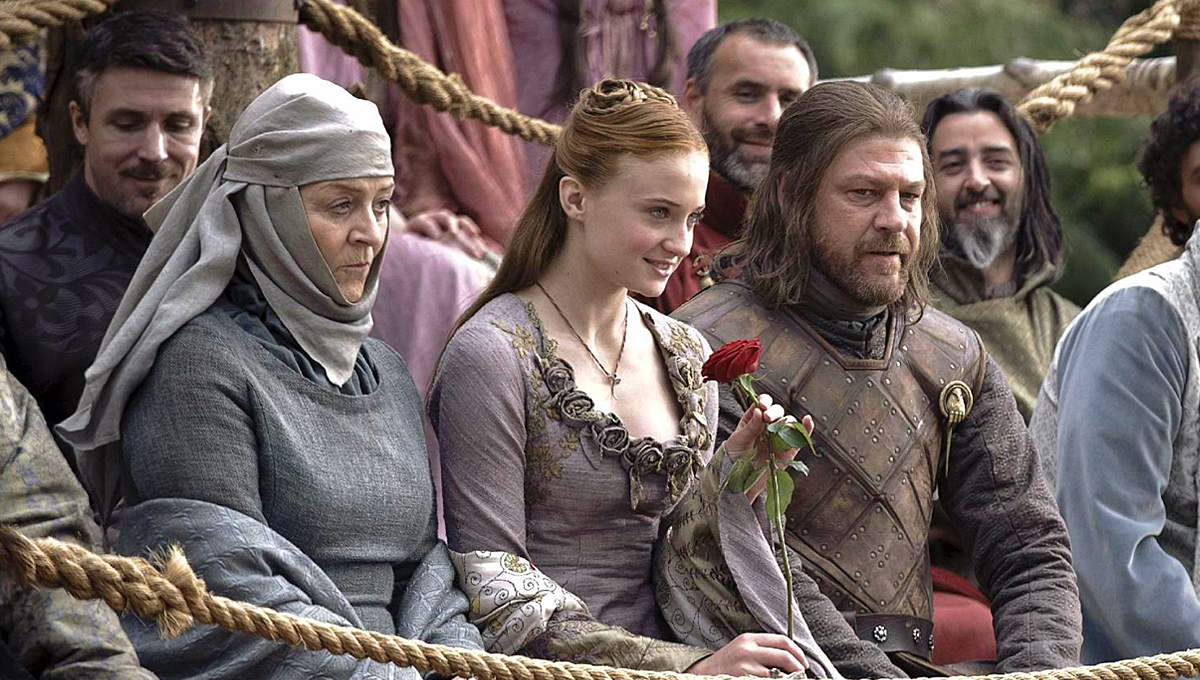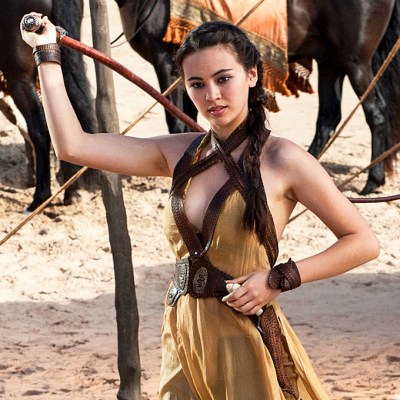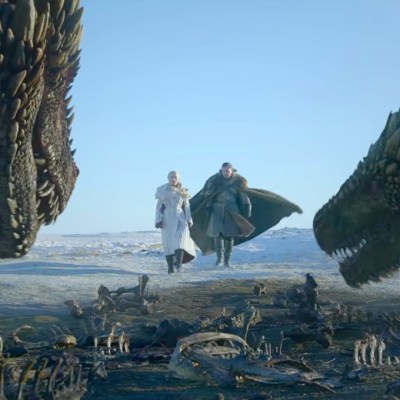Game of Thrones may have concluded its story in a divisively pyrrhic fashion, but the franchise wasn’t exactly left in ashes, thanks to a backlog brimming with several spinoff shows supported by creator George R.R. Martin’s purportedly eight-figure, five-year deal recently signed with HBO. However, it appears that the mythology, adapted from Martin’s novels, is set to invade another arena, a Broadway stage, with a Game of Thrones play now in development. Interestingly, rather than rehashing the show, the play will instead showcase a heretofore unseen storyline crucial to the hit TV series.
The Great Tourney at Harrenhal will serve as the backdrop for the gestating Game of Thrones play, which will hail from producers Simon Painter and Tim Lawson (The Illusionists) in partnership with Kilburn Live, according to THR. The production will carry necessary gravitas, since playwright Duncan MacMillan (1984) will work with Martin himself on the story, which is to manifest on the stage under the auspices of director Dominic Cooke (The Courier). The untitled play is planned for a 2023 premiere—in a hopefully post-pandemic world—for which productions are to launch on Broadway, London’s West End and Australia.
“The play will for the first time take audiences deeper behind the scenes of a landmark event that previously was shrouded in mystery,” reads the official description. “Featuring many of the most iconic and well-known characters from the series, the production will boast a story centered around love, vengeance, madness and the dangers of dealing in prophecy, in the process revealing secrets and lies that have only been hinted at until now.”
While the clashing concepts of Game of Thrones and a Broadway production might immediately evoke the imagery of an indulgently hokey musical rife with random, elaborately-choreographed song and dance numbers, this production centers on a story that’s specifically complementary to the eight-season-spanning television series, which not only had to alter its adaptation timeline to make certain concepts fit, but eventually surpassed the chronology of the source material, Martin’s A Song of Ice and Fire novels; a measure made necessary due to the author’s notorious, now-decade-long case of writer’s block for the would-be sixth and penultimate entry, The Winds of Winter. Yet, the play’s setting could prove pertinent to both the novels and TV series, on which it was discussed extensively, as exemplified by Littlefinger’s detailed account to Sansa, seen just below.
While Game of Thrones has showcased tourneys, they paled in comparison to the event in question. Frequently mentioned throughout the HBO series, The Great Tourney at Harrenhal is essentially the unseen inciting incident of the show. It took place in the Westerosi calendar year of 281 AC (After the Conquest of Aegon), the Year of the False Spring, which was about 16 years before the events of the main series commenced. With it being the most important event in Westeros, we can expediently expect the play to feature on-stage (younger) versions of familiar characters from the series such as Ned Stark, Benjen Stark, Jaime Lannister, Cersei Lannister, Tyrion Lannister, Tywin Lannister, Robert Baratheon, Oberyn Martell, Barristan Selmy and Jon Arryn, not to mention schemers like Littlefinger and Varys—essentially anyone who was old enough to have attended. However, the tourney’s initial significance to the mythology is not based on its results, but rather what occurred after Prince Rhaegar Targaryen emerged victorious in the joust, and a subsequent romantic act that would thrust Westeros into war and lead to the downfall of his royal house.
Read more
“The seeds of war are often planted in times of peace,” explains Martin in a statement. “Few in Westeros knew the carnage to come when highborn and smallfolk alike gathered at Harrenhal to watch the finest knights of the realm compete in a great tourney, during the Year of the False Spring. It is a tourney oft referred during HBO’s Game of Thrones, and in my novels, A Song of Ice & Fire … and now, at last, we can tell the whole story… on the stage.”
Notably, the tourney’s titular fortress location was featured in Game of Thrones’ second season, shown as being in disrepair by the time an incognito, revenge-driven Arya Stark stalked its halls while Tywin Lannister used it as a wartime base of operations. The 10-day event was historically known to be the greatest tourney of its generation, in which legendary knights of Westeros showcased their talents in competitive events such as the joust, horse-racing, melee, archery, axe-throwing and even singing. Pertinently, in the joust—the most important event—Rhaegar out-tilted the kingdom’s greatest warriors and, as winner, was tasked with the tradition of giving the floral gift of the Winter Rose to an attending woman to declare love or amorous intent as “Queen of Love and Beauty.” Yet, in a public act of defiance to his royal marriage of convenience, Rhaegar rode past wife Elia Martell to give the rose to Lyanna Stark, thusly revealing his secret love affair. Said act wrought chaos across the Seven Kingdoms, since it insulted Lyanna’s betrothed, Robert Baratheon, and the infidelity dealt to the Dornish Martell princess insulted the honor of her family, leaving Westeros’ most powerful houses irate.

Consequently, the Game of Thrones play will seemingly showcase the catalyst for the series-preceding war known as Robert’s Rebellion, a civil war in the Seven Kingdoms that pitted the alliance of House Baratheon, allies in the North the Starks and the opportunistic Lannisters (who kept Dorne at bay with Elia and her children held as hostages,) against the ruling Targaryens. The climax of that colossal conflict—by way of a secret wedding between Rhaegar and Lyanna that gave the world Jon Snow—set the stage for the events of the series, the beginning of which saw the victorious Robert Baratheon years later as a drunken, uncouth, ennui-addled king in a loveless political marriage to Cersei Lannister, whose family was plotting elaborate machinations to procure the Iron Throne; a fraught hornet’s nest of a status quo that was shaken significantly by the schemes of Littlefinger, who was later revealed to have been behind the show’s initially dominant mystery, the murder of Jon Arryn.
The untitled Game of Thrones play is planned for 2023, by which point the first of HBO’s spinoff slate, prequel series House of the Dragon, will presumably have already dropped. While stage adaptations even of this caliber tend not to be considered canon to their respective franchises—save perhaps for Harry Potter and the Cursed Child—it could nevertheless prove to be of interest to a wide variety of consumers, be it Game of Thrones fans to frequenters who will pay to see just about anything on a proscenium stage to satiate a restlessness from the industry’s COVID-caused hiatus.


